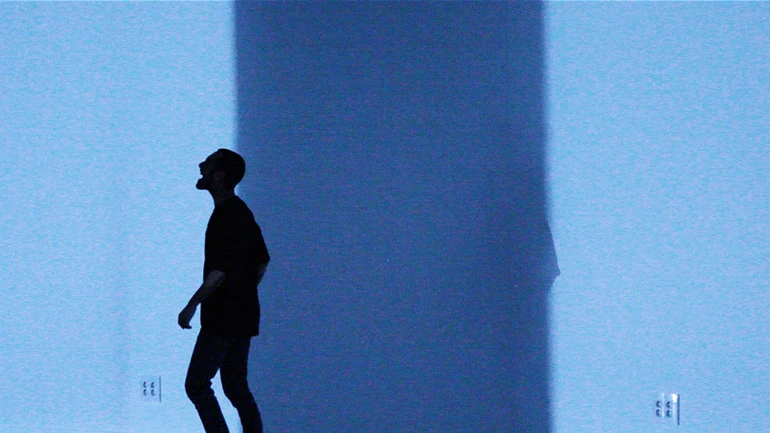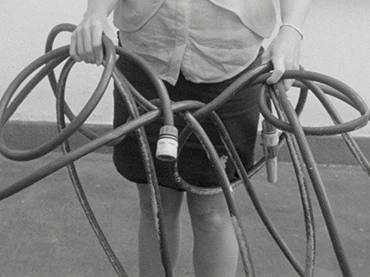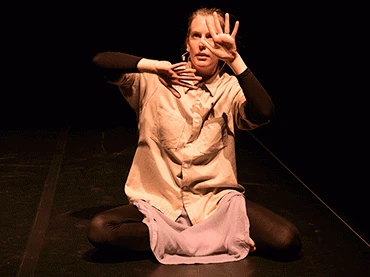ESTUDIO in Conversation

Held on 20 Oct 2020
ESTUDIO in Conversation is an encounter which makes up part of the second edition of ESTUDIO, “Half Said, Unsaid”, a programme which brings together the enquiries of artists and researchers whose practices are tied, either directly or dialogically, to the sphere of choreography and performance, voice and word.
The activity seeks to bring the public in touch with different performance proposals, before they take place, by approaching fields of research that explore the array of projects presented. Thus, it puts forward a common space of learning in the form of a colloquium with speakers associated with the artists participating in this second edition. Approached around four conversations, the encounter opens up reflections, formulates questions and shares references to detect or reveal common interests, connections and potential. In short, a journey through the limits where the word emerges.
Programme
10am - 10:15am
Presentation
10:15am - 11am
Jesús Alcaide in conversation with Nazario Díaz about Speak to Me, Body
11am - 11:45am
Julia Morandeira in conversation with Flora Détraz about Tutuguri
11:45am - 12:15pm
Break
12:15pm - 1pm
Isabel de Naverán in conversation with Loreto Martínez Troncoso about Souffle(s)! [Delusions of (a) Garden]
1pm - 1:45pm
Fran MM Cabeza de Vaca and José Luis Espejo in conversation with Niño de Elche about The Breeze Carries Lies
1:45pm - 2pm
Closure
Organised by
Museo Reina Sofía
Sponsorship

Educational program developed with the sponsorship of

Participants
Jesús Alcaide (Córdoba, 1977) is an art critic and independent curator. He is editor of the anthology Pepe Espaliú. La imposible verdad. Textos 1987-1993 (La Bella Varsovia, 2018), and has worked on different curatorial projects on the work of this artist, for instance Pepe Espaliú. Tres temps (Tecla Sala, Hospitalet, 2018), Pepe Espaliú. En estos veinticinco años (García Galería, Madrid, 2018), Aquí y ahora. Pepe Espaliú (Centro de arte Pepe Espaliú, Córdoba, 2018) and Pepe Espaliú-Juan Muñoz. Correspondencias (Sala Verónicas, Murcia, 2019). Alcaide has worked alongside Nazario Díaz in the research project Looking for Pepe, from its inception and through its different presentations and formalisations.
Fran MM Cabeza de Vaca (Las Palmas de Gran Canaria, 1976) is a composer, sound artist and music teacher. He has premiered instrumental, electronic and stage pieces at national and international festivals, and has participated as a composer and performer in different stage pieces, for instance Aitana Cordero’s La Casa and ECLIPSE : MUNDO, by Paz Rojo. Noteworthy among his audiovisual work are three feature-length documentaries, made with José Luis Tirado, and his active involvement in the audiovisual collective ZEMOS98. Since 2012, he has worked closely on different works with the poet María Salgado, including the stage recital Hacía un ruido (2014) and the audio-textual pieces Jinete Último Reino Frag.3 (2017) and Jinete Último Reino Frag.2 (2019). He also lectures on the MA in Thought and Contemporary Stage Creation at the Escuela Superior de Arte Dramático de Castilla y León (ESADCYL) and coordinates the Communities section in the Museo Reina Sofía’s Education Department.
José Luis Espejo (Barcelona, 1983) is a teacher, researcher and exhibition and concert curator. After studying Art History, he bases his research on the relationships between the art and culture of listening, participating in self-managed projects such as Mediateletipos and Ursonate Fanzine. He is in charge of curating live arts (music-sound) in the Museo Reina Sofía’s Public Activities Department and is a contributor to RRS, the Museo’s online radio station. Moreover, he coordinates the module on Theory and History on the MA in the Music Industry and Sound Studies at Carlos III University in Madrid. He is the editor of Escucha, por favor (EXit Libris, 2019).
Julia Morandeira Arrizabalaga (Getxo, 1986) is a researcher and curator who co-directs, with Manuel Segade, the Escuelita Research Department in the Centro de Arte Dos de Mayo (CA2M) in Madrid, and is a mediator in the project Concomitentes. She is also a tutor on the Dutch Art Institute MA, Netherlands, and a lecturer on the MA in the Arts and Artistic Professions from the SUR School at the Círculo de Bellas Artes and La Fábrica. She conducts her work in long-haul curatorial research projects such as Canibalia; Be careful with each other, so we can be dangerous together; Nothing is true, everything is alive; Coreografías sociales and Estudios de la noche.
Isabel de Naverán (Getxo, 1976) conducts research at the crossroads between art, contemporary choreography and performance in projects of curatorship, publishing and writing. She holds a PhD in Art from University of the Basque Country and is part of the research group Artea. In 2010, she founded, with Leire Vergara, Miren Jaio and Beatriz Cavia, Bulegoa z/b - Oficina de arte y conocimiento in Bilbao, a project she was connected to until 2018. Since 2017 she has been in charge of curating live arts (dance-performance) in the Museo Reina Sofía’s Public Activities Department.
Más actividades

Aesthetics of Peace and Desertion Tactics
8 October 2025 – 24 June 2026
The study group Aesthetics of Peace and Tactics of Desertion: Prefiguring New Pacifisms and Forms of Transitional Justice proposes a rethinking—through both a theoretical-critical and historical-artistic lens—of the intricate network of concepts and practices operating under the notion of pacifism. A term not without contestation and critical tension, pacifism gathers under its name a multiplicity of practices—from anti-militarism and anti-war movements to non-violence activism—while simultaneously opening urgent debates around violence, justice, reparation, and desertion. Here, pacifism is not conceived as a moral doctrine, but as an active form of ethical and political resistance capable of generating aesthetic languages and new positions of social imagination.
Through collective study, the group seeks to update critical debates surrounding the use of violence and non-violence, as well as to explore the conflict of their representation at the core of visual cultures. In a present marked by rearmament, war, genocide, and the collapse of the social contract, this group aims to equip itself with tools to, on one hand, map genealogies and aesthetics of peace—within and beyond the Spanish context—and, on the other, analyze strategies of pacification that have served to neutralize the critical power of peace struggles. Transitional and anti-punitive justice proposals will also be addressed, alongside their intersections with artistic, visual, and cinematic practices. This includes examining historical examples of tribunals and paralegal activisms initiated by artists, and projects where gestures, imaginaries, and vocabularies tied to justice, reparation, memory, and mourning are developed.
It is also crucial to note that the study programme is grounded in ongoing reflection around tactics and concepts drawn, among others, from contemporary and radical Black thought—such as flight, exodus, abolitionism, desertion, and refusal. In other words, strategies and ideas that articulate ways of withdrawing from the mandates of institutions or violent paradigms that must be abandoned or dismantled. From feminist, internationalist, and decolonial perspectives, these concepts have nourished cultural coalitions and positions whose recovery today is urgent in order to prefigure a new pacifism: generative, transformative, and radical.
Aesthetics of Peace and Tactics of Desertion, developed and led by the Museo Reina Sofía’s Studies Management, unfolds through biweekly sessions from October to June. These sessions alternate between theoretical discussions, screenings, work with artworks and archival materials from the Museo’s Collection, reading workshops, and public sessions. The group is structured around sustained methodologies of study, close reading, and collective discussion of thinkers such as Judith Butler, Elsa Dorlin, Juan Albarrán, Rita Segato, Sven Lütticken, Ruth Wilson Gilmore, and Franco “Bifo” Berardi; historical episodes such as the anti-nuclear and anti-arms race movement in Spain; and the work of artists and activists including Rojava Film Commune, Manuel Correa and the Oficina de Investigación Documental (Office for Documentary Investigation), and Jonas Staal, among other initial cases that will expand as the group progresses.

Institutional Decentralisation
Thursday, 21 May 2026 – 5:30pm
This series is organised by equipoMotor, a group of teenagers, young people and older people who have participated in the Museo Reina Sofía’s previous community education projects, and is structured around four themed blocks that pivot on the monstrous.
This fourth and final session centres on films that take the museum away from its axis and make it gaze from the edges. Pieces that work with that which is normally left out: peripheral territories, unpolished aesthetics, clumsy gestures full of intent. Instead of possessing an institutional lustre, here they are rough, precarious and strange in appearance, legitimate forms of making and showing culture. The idea is to think about what happens when central authority is displaced, when the ugly and the uncomfortable are not hidden, when they are recognised as part of the commons. Film that does not seek to be to one’s liking, but to open space and allow other ways of seeing and inhabiting the museum to enter stage.

Intergenerationality
Thursday, 9 April 2026 – 5:30pm
This series is organised by equipoMotor, a group of teenagers, young people and older people who have participated in the Museo Reina Sofía’s previous community education projects, and is structured around four themed blocks that pivot on the monstrous.
The third session gazes at film as a place from which to dismantle the idea of one sole history and one sole time. From a decolonial and queer perspective, it explores films which break the straight line of past-present-future, which mix memories, slow progress and leave space for rhythms which customarily make no room for official accounts. Here the images open cracks through which bodies, voices and affects appear, disrupting archive and questioning who narrates, and from where and for whom. The proposal is at once simple and ambitious: use film to imagine other modes of remembering, belonging and projecting futures we have not yet been able to live.

Remedios Zafra
Thursday March 19, 2026 - 19:00 h
The José Luis Brea Chair, dedicated to reflecting on the image and the epistemology of visuality in contemporary culture, opens its program with an inaugural lecture by essayist and thinker Remedios Zafra.
“That the contemporary antifeminist upsurge is constructed as an anti-intellectual drive is no coincidence; the two feed into one another. To advance a reactionary discourse that defends inequality, it is necessary to challenge gender studies and gender-equality policies, but also to devalue the very foundations of knowledge in which these have been most intensely developed over recent decades—while also undermining their institutional support: universities, art and research centers, and academic culture.
Feminism has been deeply linked to the affirmation of the most committed humanist thought. Periods of enlightenment and moments of transition toward more just social forms—sustained by education—have been when feminist demands have emerged most strongly. Awareness and achievements in equality increase when education plays a leading social role; thus, devaluing intellectual work also contributes to harming feminism, and vice versa, insofar as the bond between knowledge and feminism is not only conceptual and historical, but also intimate and political.
Today, antifeminism is used globally as the symbolic adhesive of far-right movements, in parallel with the devaluation of forms of knowledge emerging from the university and from science—mistreated by hoaxes and disinformation on social networks and through the spectacularization of life mediated by screens. These are consequences bound up with the primacy of a scopic value that for some time has been denigrating thought and positioning what is most seen as what is most valuable within the normalized mediation of technology. This inertia coexists with techno-libertarian proclamations that reactivate a patriarchy that uses the resentment of many men as a seductive and cohesive force to preserve and inflame privileges in the new world as techno-scenario.
This lecture will address this epochal context, delving into the synchronicity of these upsurges through an additional parallel between forms of patriarchal domination and techno-labor domination. A parallel in which feminism and intellectual work are both being harmed, while also sending signals that in both lie emancipatory responses to today’s reactionary turns and the neutralization of critique. This consonance would also speak to how the perverse patriarchal basis that turns women into sustainers of their own subordination finds its equivalent in the encouraged self-exploitation of cultural workers; in the legitimation of affective capital and symbolic capital as sufficient forms of payment; in the blurring of boundaries between life and work and in domestic isolation; or in the pressure to please and comply as an extended patriarchal form—today linked to the feigned enthusiasm of precarious workers, but also to technological adulation. In response to possible resistance and intellectual action, patriarchy has associated feminists with a future foretold as unhappy for them, equating “thought and consciousness” with unhappiness—where these have in fact been (and continue to be) levers of autonomy and emancipation.”
— Remedios Zafra

27th Contemporary Art Conservation Conference
Wednesday, 4, and Thursday, 5 March 2026
The 27th Contemporary Art Conservation Conference, organised by the Museo Reina Sofía’s Department of Conservation and Restoration, with the sponsorship of the Mapfre Foundation, is held on 4 and 5 March 2026. This international encounter sets out to share and debate experience and research, open new channels of study and reflect on conservation and the professional practice of restorers.
This edition will be held with in-person and online attendance formats, occurring simultaneously, via twenty-minute interventions followed by a five-minute Q&A.

